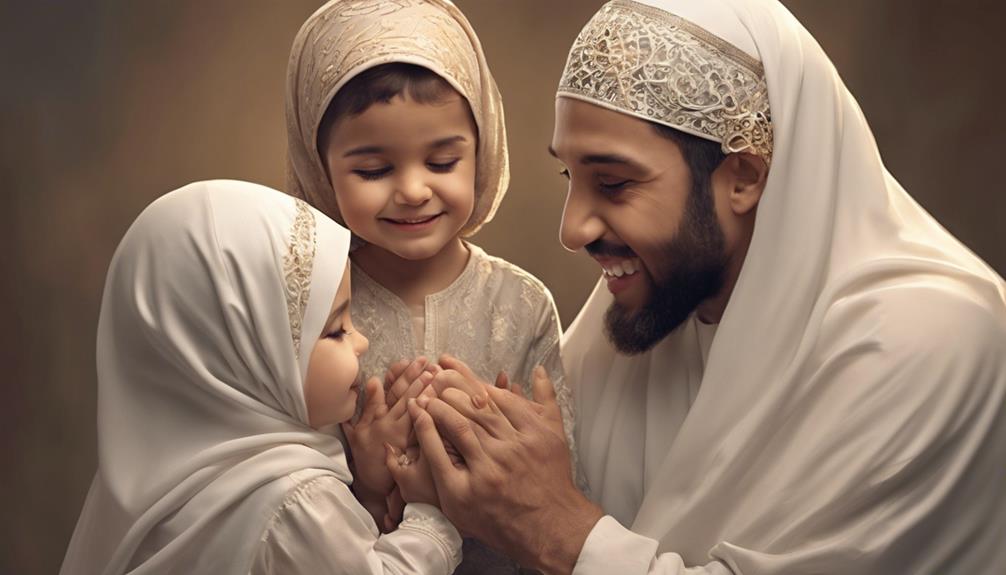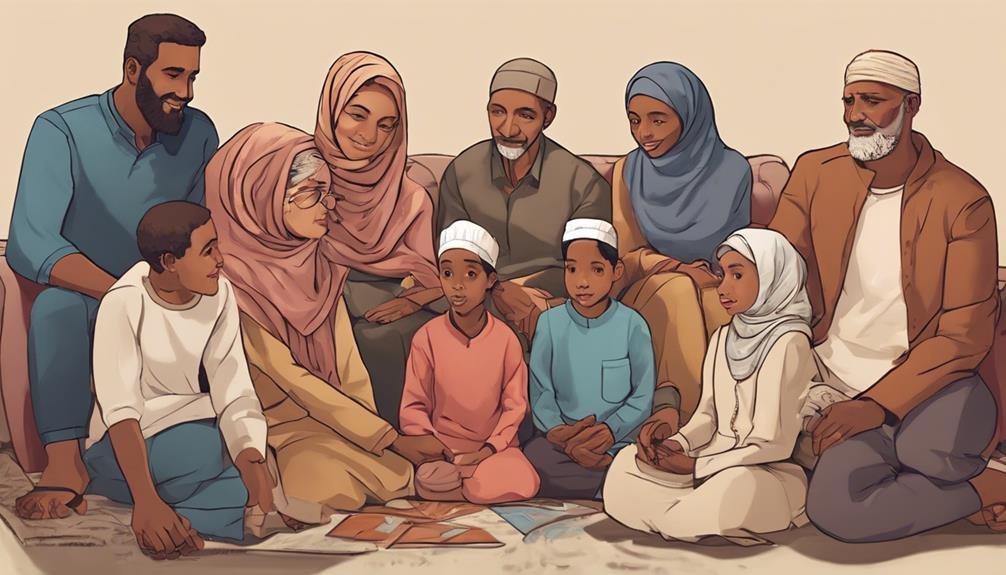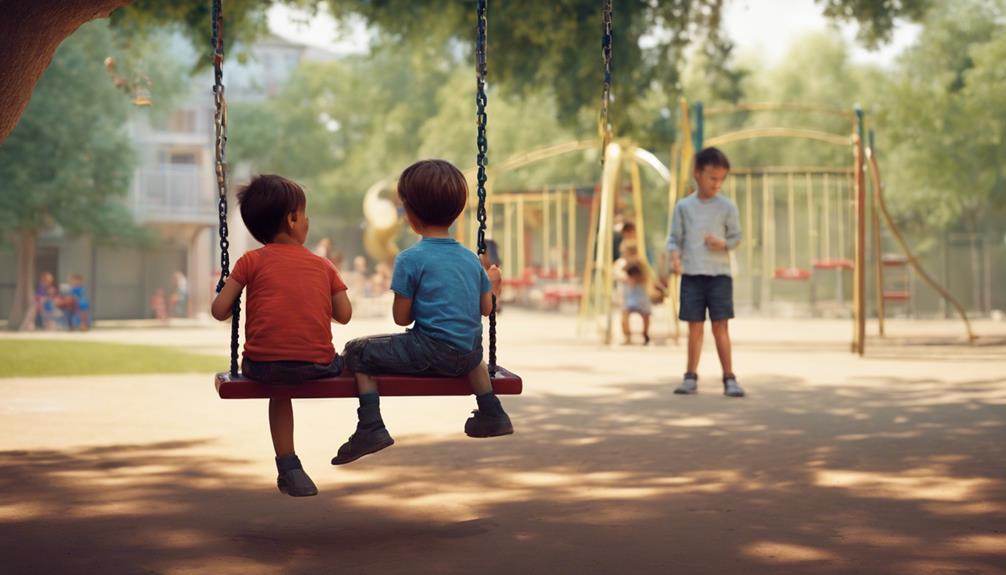Navigating the complexities of Islamic divorce with children involved can be challenging, however, there are some essential guidelines that can help make the journey a bit more manageable.
Understanding the nuances of talaq, child custody arrangements, and financial responsibilities can be enlightening for those unfamiliar with Islamic divorce procedures. These guidelines offer valuable insights into maintaining the well-being of children and ensuring fair outcomes for all parties involved.
The journey through divorce in Islam with children is multifaceted, and exploring these 10 important guidelines can provide a deeper understanding of the process and its implications on families.
Key Takeaways
- Prioritize children's well-being in custody decisions, considering factors such as age and gender.
- Ensure adherence to Islamic divorce laws and legal procedures for a smooth process.
- Establish clear parenting plan agreements post-divorce to meet the child's best interests.
- Seek mediation and support services for effective communication, cooperation, and minimizing negative impacts on children.
The Concept of Talaq in Islam
In Islam, the concept of Talaq, initiated by the husband, involves pronouncing the word 'talaq' three times to divorce his wife. This method of divorce is deeply intertwined with Islamic law and carries significant weight in marital relationships.
The utterance of 'talaq' is a solemn act with far-reaching consequences, affecting not only the couple but also any children involved. When a husband invokes talaq, the intricate process of divorce begins, and considerations such as custody of the child come into play.
Islamic teachings underscore the gravity of talaq, emphasizing the need for careful contemplation before taking such a step. The welfare of any children from the marriage is a crucial aspect that should be handled with utmost care and sensitivity in accordance with Islamic principles.
Understanding the nuances of talaq within the context of Islamic law is essential for navigating the complexities of divorce while safeguarding the well-being of all parties involved.
Child Custody Arrangements

When it comes to child custody arrangements in Islam, legal guardianship rights and parenting plan agreements play a crucial role in ensuring the well-being of the children involved.
Understanding the rights and responsibilities of each parent in the custody process is essential for creating a supportive and stable environment for the children.
Legal Guardianship Rights
Legal guardianship rights in child custody arrangements prioritize the well-being and best interests of the children involved, ensuring they're provided with a stable and nurturing environment.
According to Islamic teachings, custody decisions are made with a profound emphasis on what's best for the child. In cases where the mother remarries or specific circumstances change, custody rights may be reassessed, always with the child's welfare at the forefront.
Islamic law underscores the significance of creating a supportive and caring atmosphere for children, taking into account factors such as the child's age, gender, and the capabilities of each parent.
Guardianship rights in child custody arrangements are rooted in compassion, ethics, and the fundamental principle of safeguarding the child's well-being.
Parenting Plan Agreements
Emphasizing the well-being and stability of the children involved, parenting plan agreements detail post-divorce child custody arrangements and outline parental responsibilities. These agreements address custody schedules, decision-making authority, and communication plans for effective co-parenting. By considering the child's best interests, parenting plans aim to ensure their welfare and provide a structured framework for shared child-rearing responsibilities. Agreement on visitation schedules, holidays, and special occasions is vital for maintaining a harmonious co-parenting relationship. Such plans not only help minimize conflicts but also establish clear guidelines for both parents to follow, fostering a supportive environment for the children. Effective communication and cooperation between parents are key to successful implementation of parenting plan agreements.
| Aspect | Details |
|---|---|
| Custody Schedules | Structured plan for child visitation and living arrangements |
| Decision-Making Authority | Determining who has the final say in major decisions |
| Co-Parenting Communication Plans | Strategies for effective communication between parents |
Financial Support Responsibilities
In Islam, fathers bear the responsibility of providing financial support for their children, as mandated by Islamic teachings. Child support is a crucial aspect of ensuring that the financial needs of the children are met, and courts enforce these payments to guarantee the well-being of the children.
The Quran emphasizes the importance of fair consultation between parents regarding financial responsibilities for their children, highlighting the significance of mutual agreement and understanding in fulfilling these obligations. Islamic law dictates that husbands must continue to provide for their children during and after marriage, recognizing that financial support for children is a fundamental right that fathers must uphold.
Emotional Well-being of Children

As we address the emotional well-being of children in the context of divorce, it's crucial to consider the impact on their mental health.
Providing child counseling support, maintaining stability and routine, and fostering open communication through co-parenting are essential components in helping children navigate the emotional challenges that arise from divorce.
Child Counseling Support
Child counseling support is crucial in nurturing the emotional well-being of children during divorce. Prioritizing children's emotional needs when dealing with custody arrangements is essential. Counseling services create a safe space for children to express their feelings and overcome challenges. Professional counselors help children understand and cope with divorce-related emotions. Offering tailored guidance and strategies, counselors support children in developing healthy coping mechanisms and resilience. This support is vital in helping children navigate the complexities of divorce successfully.
Stability and Routine
Navigating the emotional well-being of children during and after divorce heavily relies on providing stability and maintaining routines that promote a sense of security and continuity in their lives. Children, both emotionally and physically, benefit greatly from a stable environment where consistent schedules and familiar settings offer them a sense of security.
It's crucial for the custody of children to ensure they've regular contact with both parents, fostering a feeling of continuity and support. Encouraging open communication and addressing children's concerns play vital roles in helping them cope with the changes divorce brings.
Establishing a positive co-parenting relationship is key to creating a stable and nurturing environment that prioritizes the well-being of the children involved.
Co-parenting Communication
Effective co-parenting communication post-divorce is essential for nurturing the emotional well-being of children. Prioritizing the interests of the child through open and respectful co-parenting communication is crucial.
By maintaining clear and consistent dialogue between parents regarding schedules, expectations, and decisions, children can better adjust to the new family dynamics with reduced confusion and stress. It's paramount that co-parenting communication revolves around the children's needs, aiming to minimize conflict and hostility.
Healthy communication practices between co-parents create a supportive and stable environment where children can thrive despite the challenges of divorce. Remember, fostering strong co-parenting communication is key to promoting the emotional well-being of the child after divorce.
Legal Procedures and Documentation

To initiate the legal procedures for divorce in Islam with children, it's crucial to adhere to the guidelines of talaq or khula as prescribed by Islamic law. Proper documentation plays a vital role in ensuring the protection of the rights and responsibilities of both parents and the well-being of the children during and after the divorce process.
- Child Custody: The divorce documentation should clearly outline the arrangements for child custody to ensure the best interests of the child are met.
- Financial Responsibilities: It's essential to document the financial responsibilities of both parents post-divorce to provide clarity and avoid any misunderstandings.
- Witnesses Present: Islamic requirements mandate having witnesses present during the divorce proceedings to validate the divorce and ensure its legality.
Mediation and Conflict Resolution

When considering mediation and conflict resolution during divorce proceedings in Islam with children, it is essential to prioritize effective communication and cooperation between parents. Mediation services play a crucial role in assisting parents in resolving conflicts amicably, especially when it comes to matters like child custody and visitation. These services emphasize conflict resolution techniques such as active listening and compromise, fostering a cooperative co-parenting relationship that benefits the children involved. Mediators act as facilitators, guiding parents towards reaching agreements that prioritize the well-being of their children. By engaging in mediation, parents can reduce emotional stress on their children and work towards creating a parenting plan that suits everyone's needs.
| Benefits of Mediation | Aspects Emphasized |
|---|---|
| Assists in conflict resolution | Active listening |
| Promotes cooperative co-parenting | Compromise |
| Facilitates communication | Child custody agreements |
In mediation, parents have the opportunity to address their concerns, collaborate on solutions, and build a foundation for a positive co-parenting relationship post-divorce.
Co-parenting Communication Strategies

As we navigate the complexities of co-parenting, it's crucial to employ effective communication tools and establish clear boundaries.
By maintaining an open and respectful dialogue, we can prioritize our children's well-being and keep their best interests at the forefront of our discussions.
Utilizing resources like co-parenting apps and shared calendars can aid us in improving communication and coordination for the benefit of our co-parenting relationship.
Effective Communication Tools
Navigating effective communication tools in co-parenting involves establishing clear boundaries and expectations to foster a harmonious environment for all involved. When focusing on the child's best interest, co-parents can benefit from utilizing the following strategies:
- Respectful Language: Using respectful and non-confrontational language fosters a positive atmosphere for discussions.
- Written Communication: Utilizing emails or apps helps in maintaining a documented record of agreements, reducing misunderstandings.
- Active Listening: Practicing active listening and empathy is essential for understanding each other's perspectives, enhancing communication and cooperation.
Establishing Clear Boundaries
Establishing clear boundaries in co-parenting communication is crucial for fostering a successful post-divorce parenting dynamic. By setting specific guidelines for discussing children's needs and schedules, we ensure that decisions are made in the child's best interest.
Clearly defining parenting roles and responsibilities helps avoid conflicts and confusion. Communication guidelines are essential to maintain a respectful and effective co-parenting relationship. Utilizing tools like shared calendars or co-parenting apps aids in coordinating schedules and sharing important information seamlessly.
It's important to respect each other's time with the children and uphold consistency in parenting approaches. Ultimately, by establishing these boundaries, we create a supportive environment that prioritizes the well-being of our children.
Involvement of Extended Family

Drawing on the strength of our extended family can serve as a pillar of support and guidance during the challenging process of divorce, particularly when children are involved. Involving extended family members can significantly benefit everyone's well-being and contribute to the child's best interest.
Here are some ways in which extended family can support families through divorce:
- Emotional Support: Extended family can provide a safe space for sharing feelings and offer comfort during difficult times.
- Facilitating Communication: Family members can help in fostering open communication between parents, aiding in conflict resolution and co-parenting arrangements.
- Additional Care for Children: Involving extended family ensures that children receive extra care and attention, promoting their stability and emotional health during the transition period.
Counseling and Support Services

Counseling services play a crucial role in providing support and guidance for couples navigating the challenging process of divorce in Islam. Seeking counseling is not a sign of weakness but a proactive step towards understanding each other's perspectives and working towards reconciliation. In line with Prophet Muhammad's teachings, diverse Imams offer counseling appointments to assist in reconciliation and provide guidance during divorce proceedings. Communication, self-reflection, and forgiveness are encouraged during counseling sessions to help couples address underlying issues before resorting to divorce. These reconciliation efforts are not only beneficial for the couple but also essential for the child's best interest, aiming to minimize the negative impact of divorce on families. Support services offered through counseling provide a safe space for couples to express their feelings, receive advice, and work towards a healthier relationship dynamic. Embracing counseling and support services reflects a commitment to following the wisdom and compassion advocated by Prophet Muhammad.
| Reconciliation | Support Services | Child's Best Interest |
|---|---|---|
| Promotes healing | Offers guidance | Minimizes negativity |
| Encourages dialogue | Provides emotional support | Prioritizes well-being |
| Strengthens relationships | Ensures a safe space | Fosters stability |
Re-marriage Considerations

When considering re-marriage after divorce in Islam, it's important to understand the guidelines and procedures that ensure respect, decency, and adherence to Islamic principles. As we navigate this sensitive process, it's crucial to prioritize the needs of children and uphold their rights to a stable and nurturing environment.
Here are some key points to consider:
- Children's Needs: Put the well-being and emotional stability of the children at the forefront of all decisions.
- Child is Older: Take into account the age and maturity of the child when discussing custody arrangements and introducing potential step-parents.
- Right to Custody: Respect the child's right to maintain a relationship with both parents and ensure that custody agreements are made in the child's best interest.
Remarrying after divorce in Islam involves a new beginning for both individuals and their families. By approaching this process with compassion and awareness of the children's well-being, we can create a supportive environment that nurtures healthy relationships and mutual respect.
Frequently Asked Questions
What Is the Ruling on Children After Divorce in Islam?
After divorce in Islam, children's well-being is crucial. Islamic guidelines prioritize the child's best interests, ensuring fair treatment regardless of gender. Mothers often have a stronger right to custody, considering the child's upbringing and welfare.
What Are the Rules of Islamic Divorce?
We navigate Islamic divorce rules with care, understanding the intricacies of talaq, khula, and the essential waiting period. Adherence to Islamic laws is paramount as we guide through the process, ensuring a respectful resolution.
What Is a Wife Entitled to in a Divorce in Islam?
In a divorce in Islam, a wife is entitled to financial support, including deferred mahr and fair treatment. Custody of children may be granted to her. Islam emphasizes providing security and fairness to the wife post-divorce.
What Is the Responsibility of the Father in Islam After Divorce?
We ensure children's needs are met post-divorce in Islam. Fathers bear the duty to provide financial support, education, health, and welfare. It's vital they fulfill obligations, ensuring their children thrive and are well-cared for.
Conclusion
In conclusion, it's crucial to prioritize the well-being of children during the process of divorce in Islam.
Did you know that according to a study, children of divorced parents are more likely to experience emotional difficulties?
By following the guidelines and principles of Islam, we can ensure that our children's rights and needs are protected, leading to a smoother transition during this challenging time.
Let's strive to make the best decisions for our children's future.










